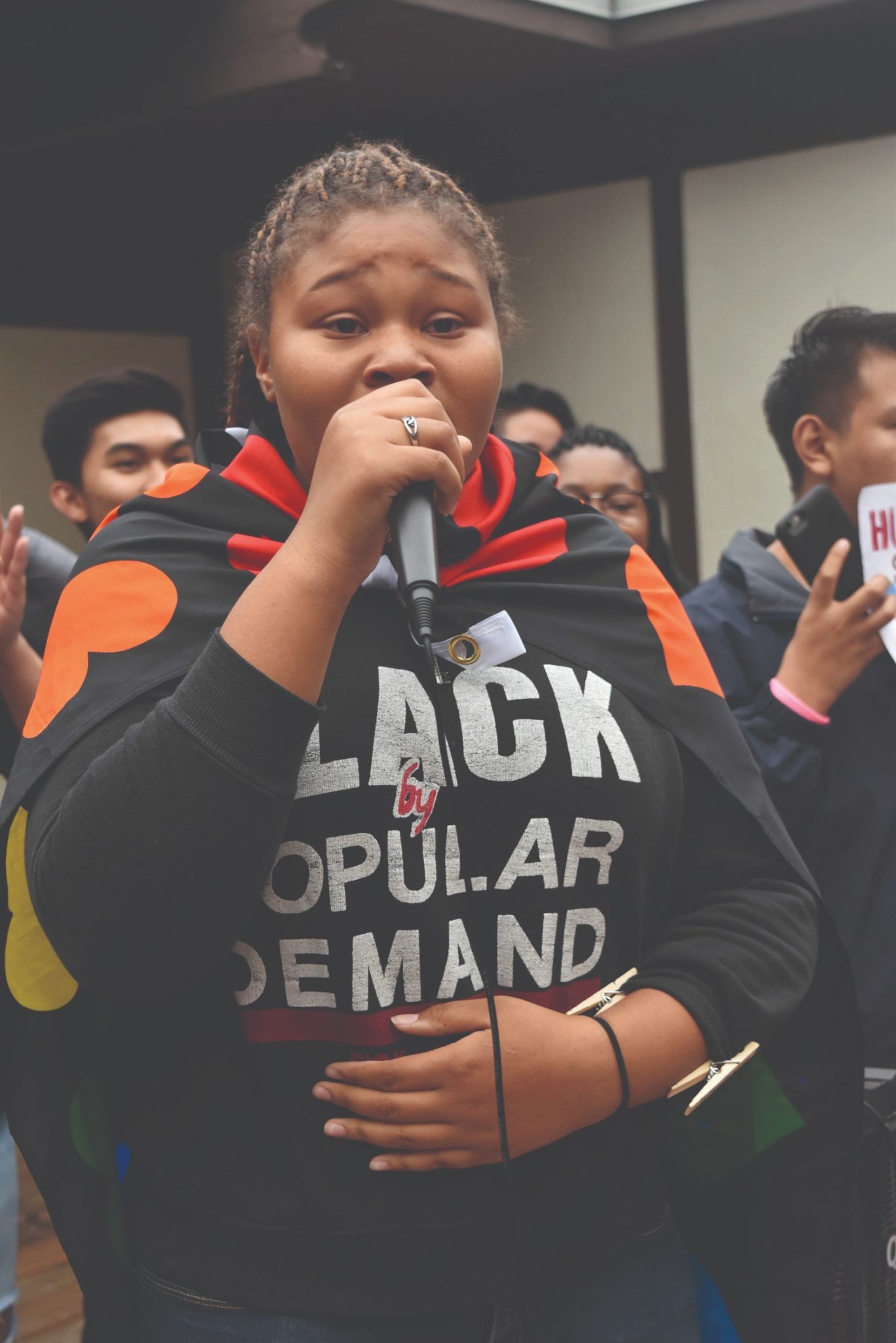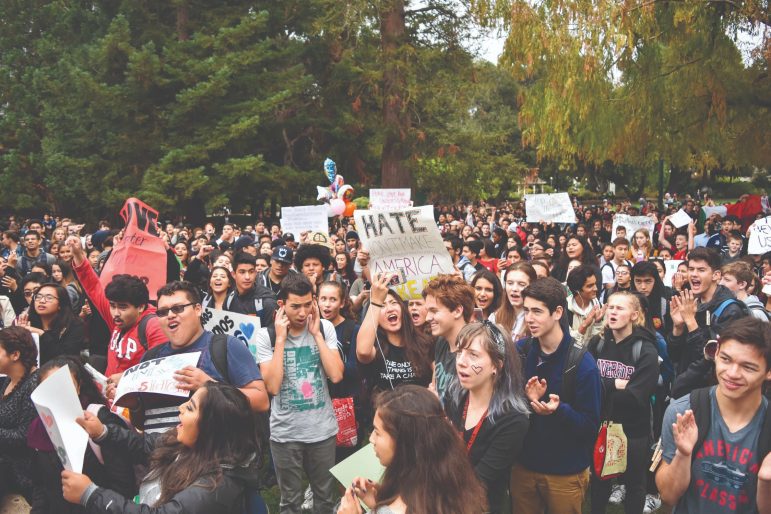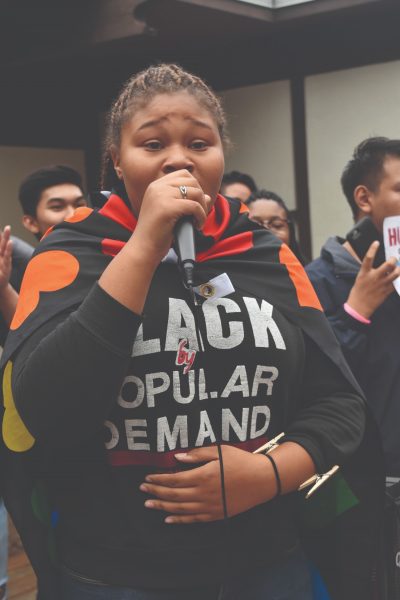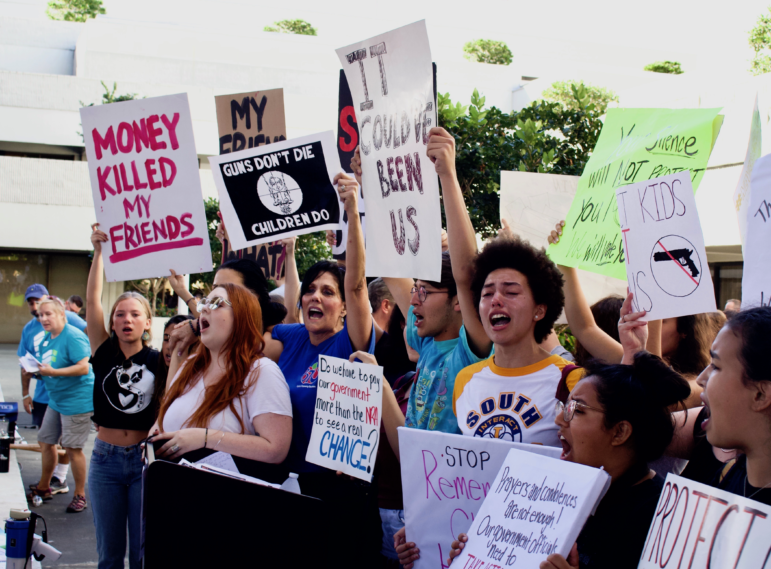
By Victoria Fong, Zack Cherkas, Caroline Huang and Claire Mason
Student activism has recently increased in visibility nationwide. However, this activism is not limited to off-campus. Students at Aragon and throughout the district have spearheaded their own campaigns to advocate for change in the community.
Marching for a change: Students plan walkouts and protests
After the Feb. 14 shooting at Marjory Stoneman Douglas, school safety has come to the forefront of student activism. Junior Cassius Hayes was inspired by last school year’s walkout to plan a walkout on March 14.
His walkout is aimed at student solidarity with other students across the nation.
“We don’t condone violence in our schools,” Hayes said. “We have the right to voice our opinions. The main focus is that we shouldn’t be scared to go to school. It’s a safe environment.”

Hayes felt the need to plan the walkout because many teachers did not discuss what happened in Parkland.
“I know the administrators have had meetings talking about what we would do [in a similar situation], but I don’t think it’s fair that they don’t have this conversation with students,” Hayes said. “What do we do in case of an emergency? A lot of students are unclear what would happen.”
At the same time, senior Karin Felsher is planning a San Mateo branch of the national March for Our Lives on March 24. The March for Our Lives is directed at raising awareness about gun violence and was started by the Stoneman Douglas survivors.
“I’ve always thought that gun violence was a huge issue, and I thought it was … almost disrespectful that our country hasn’t done anything,” Felsher said. “I know that every country is different. The way that we deal with [gun violence] will be different from Australia or Japan, but we can at least learn from other countries, and we haven’t already.”
San Mateo High School junior Kati Sandoval, who is also helping plan the March, echoes these sentiments about a lack of change.
“All the adults wanted to do was continue on with this ridiculous notion of ‘thoughts and prayers,’” she said, “like no we’re not going to continue to become numb to an epidemic that has been facing us for the past 20 years.”
Felsher has a personal connection to gun violence, as her mom was held at gunpoint when she was working in a store as a teenager.
“[Gun violence] touches so many people’s lives,” Felsher said. “So many people have been affected by guns. This can be fixed by just passing a few more bills.”
Although Hayes planned the walkout, he doesn’t see himself as an activist.
“It’s funny when people call me an activist,” he said, “because I’m just fighting for what we should already have, like feeling safe.”
Felsher feels that it is necessary for teens to speak up, especially about school safety. From the beginning, she knew that a march should be student-led. Fittingly, the motto for the San Mateo March for Our Lives is “for teens, by teens.”
However, Felsher has received backlash from planning the march. Some students believe that discussions about gun violence should be put on pause until there is a liberal president in office, she said.
“I have been comparing this to Martin Luther King [Jr.] and equality,” Felsher said. “I think this is something that may take 10 or hundreds of years to change. I hope it won’t, but I think we need to start now. Why wait?”
From here, Hayes hopes that students will use their power to speak up and voice their opinions.
“It just sucks that some people don’t feel comfortable,” he said, “but others feel way too comfortable saying things that aren’t necessarily appropriate or inclusive.”
BSU and GSA lead activism on-campus
The Black Student Union recently began a “Because I know the History” campaign on campus to eradicate the use of the n-word on campus. BSU senior Co-President Sydney Jackson, who moved to San Mateo from Philadelphia, began the movement.
“[In Philadelphia], it’s not used at all by anyone else who isn’t black, so I was kind of surprised to move here and hear it being so constantly used … so I approached our club,” Jackson said. “Instead of getting upset about it, we decided to educate people as to why it’s wrong, and try to minimize the use of the word.”
With a positive response from other club members, BSU reached out to the administration and department heads. Receiving support, they presented on the use of the n-word at the class Town Hall meetings on Feb. 26. Presentations included a short discussion and the video, “When Every Word Doesn’t Belong to Everyone,” where author Ta-Nehisi Coates explains the reasoning behind why non-African American individuals should not say the word.

However, Jackson notes that the presentations had mixed results.
“I was actually a little disappointed by the Senior Town Hall because I felt like maybe they didn’t understand it or it was too controversial and we didn’t get really any feedback,” she said. “But I was surprised by such a positive response by the sophomores and juniors, which I was happy about.”
BSU plans to continue “Because I know the History” with a button campaign, poster signing and videos in Live Announcements. Additionally, they are discussing the possibility of showing “When Every Word Doesn’t Belong to Everyone” in health and history classes.
However, Jackson understands that eradicating the n-word is a long-term effort.
“We’re not expecting this to make a quick change by the end of the year,” she said. “It’s going to take a while, but we want our voices to be heard and respected.”
The Gender Sexuality Awareness club has already made an impact at Aragon through their “Health x GSA” presentations in Health classes to increase awareness of the LGBTQ+ community. Junior Co-President Sofia Veizades has been involved in this campaign since her freshman year.
“I talk to people that have been through it or we’ve answered their question and it clears something up for them,” Veizades said, “which makes all of it worth it.”
While the club puts on Health x GSA, Veizades notes the challenges in expanding their efforts.
“Even when we can find ways [to help], it’s hard to get an open mind to those who don’t see [our efforts] as important … we always are trying and wanting to do more,” Veizades said. “Aragon is all of our homes and I want to make it safe for those like me so they don’t have to go through anything I did. But of course, to do that, we need support and sometimes it’s just hard to find it.”
Similar to the “Because I know the History” campaign, Health x GSA was started by students who saw an issue on campus and took a stand to fix it.
“A student started our GSA and students run it,” Veizades said. “Students are the ones looking after one another and standing up when no one will. There would be very little change without students, and the world needs change.”
Bringing the ballot to students
At the last San Mateo Union High School District board meeting on March 8, the board members unanimously passed a resolution to provide all the schools in the district with 4,000 voter registration forms to be distributed and completed in junior and senior classes. But the resolution was more than a victory for the board, as students from Aragon, San Mateo, Burlingame and Hillsdale also successfully concluded their campaign to register and pre-register to vote.
The push for a change came after both students and staff noticed the lack of guidance and education students had about the voting process.
Registering or pre-registering to vote is available to anyone over 16, but many students are unaware. Integrating the process at school overcomes this barrier.
“I believe that registering is the biggest hurdle,” said senior Michael Herrera, who advocated for voter registration at Aragon. “After that, you literally just get your ballot mailed to you … you just fill it out and you send it back … it’s so easy. I think if we just get people registered, they’ll find out how easy voting is, and it’s going to get a lot more people involved.”
Junior Kati Sandoval, a student advocate from San Mateo High School, believes that youth are essential to the future of politics because they have different perspectives.
“We really want our youth to be more active with what is occurring in our current political climate because we are truly the voices for change,” Sandoval said. “I believe that with informing ourselves we can work hand-in-hand with people who are willing to create a sense of unity.”
Activism is an accessible way to demonstrate need for change.
“Margaret Mead said, ‘Never doubt that a small group of thoughtful, committed citizens can change the world; indeed, it’s the only thing that ever has.’” Herrera said. “That quote speaks to every movement [that] starts out small. You don’t have a movement that’s immediately large, so we can’t be deterred by seemingly insurmountable difficulties because if it was easy, it would already be done.”
Viewpoint of a Broward County student activist
Frankie Gaynor, a senior at Coral Glades High School in Coral Springs, Florida, was getting coffee with a friend 10 minutes away from Marjory Stoneman Douglas High School when a cashier informed her that there had been a shooting on campus.
She ultimately found out that her cousin’s friend, Peter Wang, was killed, and her own friend, Benjamin Wikander, had been shot three times. In response to the shooting, she has taken a position of activism, specifically regarding gun reform, to incite change.
Because, according to Gaynor, her peers recognize her as unafraid to voice her political opinions — she cites herself as an “activist” in her Instagram biography — she has gained a following in wake of the shooting.
“It kind of just so happened where people started asking me, ‘Frankie, are you going to this? Are you doing this? What do you think of this?'” she said. “As someone who wasn’t immediately affected by it but someone who still felt the pain of the shooting, I just think I’ve been a way to sort of communicate with people across schools.”
Gaynor has also helped promote the sale of T-shirts honoring the 17 victims, whose funds will directly benefit the victims’ families.
In addition to participating in a walkout where she and her classmates walked to Stoneman Douglas, Gaynor attended the protest at the U.S. Federal Courthouse in Fort Lauderdale the Saturday after the shooting, where she witnessed Stoneman Douglas senior Emma Gonzalez’s now-viral “We call B.S.” speech.
“It’s the weirdest thing,” Gaynor said of seeing a local high school student make a national statement. “It’s just the most surreal thing to see people I know, people in my community — my [friend] met Bernie Sanders, which is so crazy — it’s just really surreal putting together two different pieces of my life and having them collide.”

After seeing firsthand the impact teens like her can have, Gaynor is considering running for office in the future.
“I wanted to go to college to study journalism and [political science] with the goal of becoming a journalist or political commentator, but after Parkland, I’m kind of on the fence about running for office and definitely taking action that way,” Gaynor said. “If people are listening to me now and care what I have to say about now, why not have them care about what I have to say in the future, when I can affect adults and not just teenagers.”
As for the present, Gaynor believes the biggest impact teens can make begins at the polls.
“As young people, we are the future, we’re the voice of the future,” she said. “And it’s up to us to vote [politicians] out, to do the research to figure out which politicians are taking money from the NRA … It’s up to this generation to ensure that high school students can not be afraid to go to class without getting shot.”



